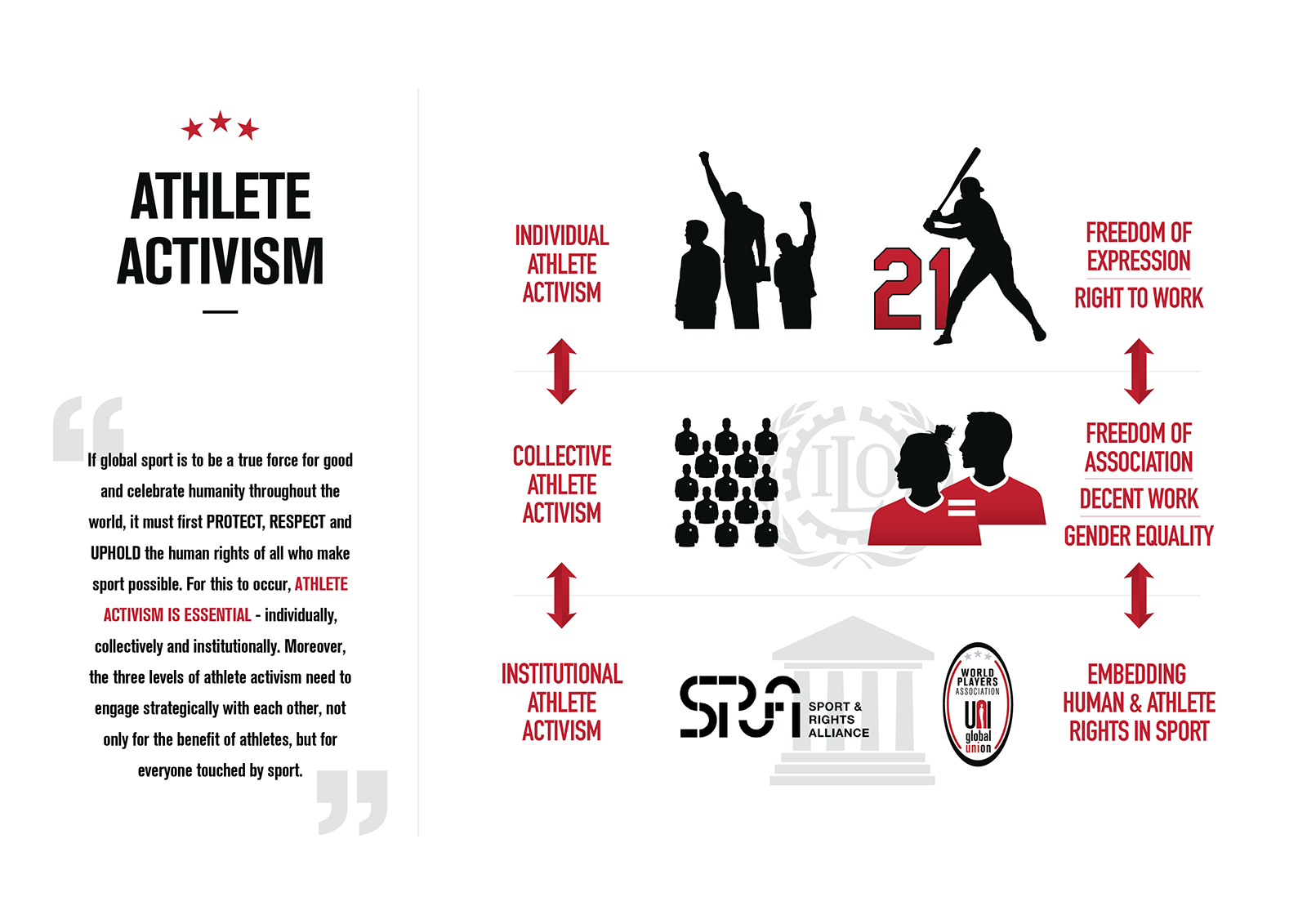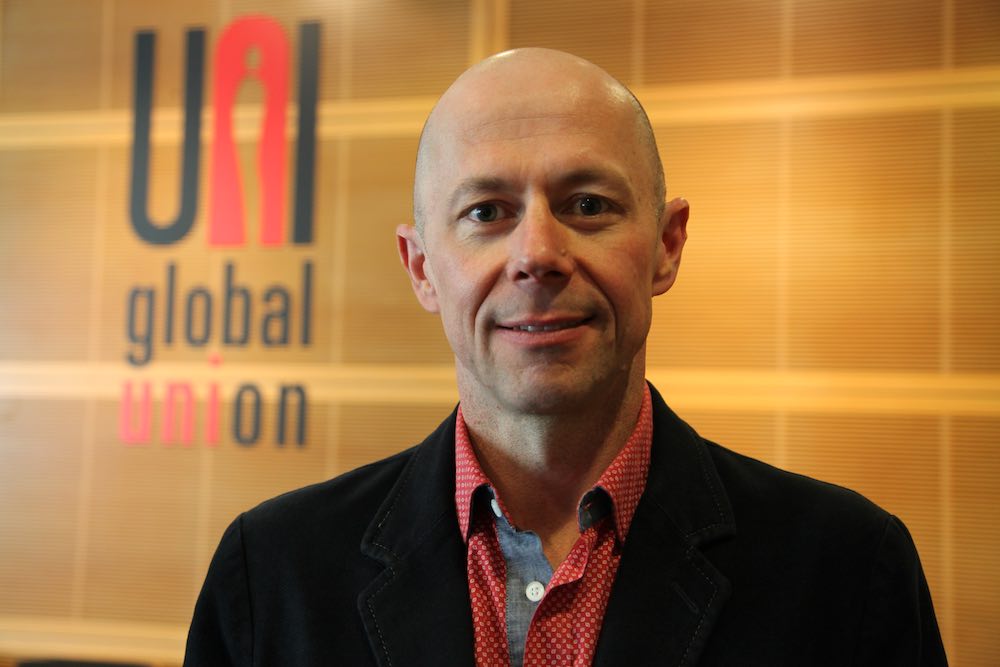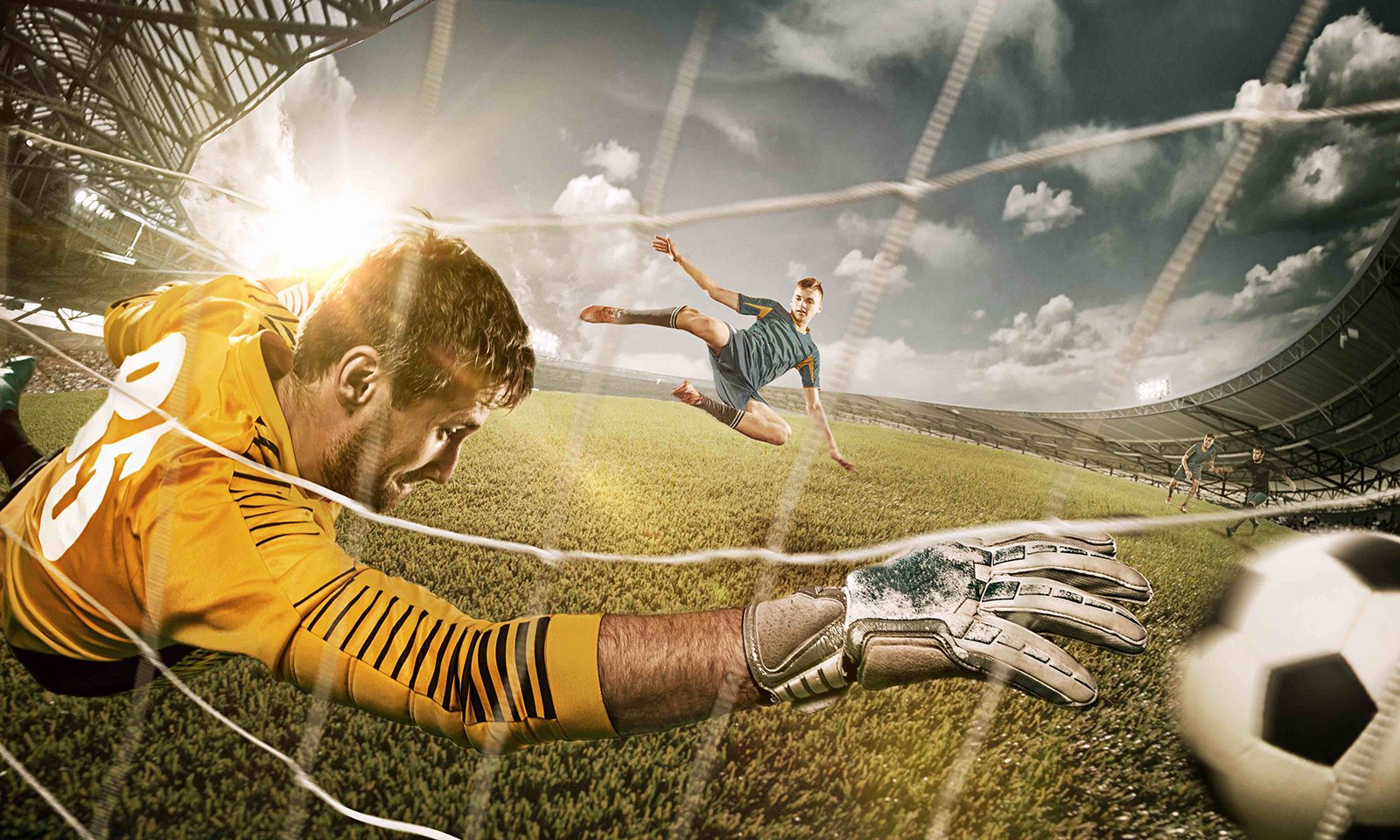Athlete activism demands systemic change - not just words and applause

If sports organisations had listened to athletes 50 years ago, sport could have helped shape a just and inclusive world.
This is a feature opinion piece by Brendan Schwab, LL.B MBA, a Swiss-based Australian lawyer who is the Executive Director of the World Players Association, the exclusive global voice of organized players and athletes across professional sport. A sector of UNI Global Union, it brings together 85,000 players through more than 100 player associations in over 60 countries.
……………………………………..
Statements from the leaders of some of the world’s most influential sports bodies, such as FIFA[1] and the NFL[2], that athlete activists should not be punished are welcome – but meaningless – without systemic change.
It is now time for sport’s leaders to demonstrate the same courage as athletes and deliver long overdue reformation of sports governance and law.
Athletes across many sports have taken a leading role in #BlackLivesMatter protests both on and off the field following the killing of George Floyd in the United States.
FIFA President Gianni Infantino said the players’ actions “deserve an applause not a punishment”. But words and applause are not and will never be enough.
Freedom of expression is a great enabling right upon which so many other human rights and freedoms depend. It cannot exist at the whim of Presidents.
It takes great courage for athletes to sacrifice what is inherently a short term and precarious career for a point of principle. That courage is amplified by archaic sports regulations that punish athletes who speak up for human rights and the very values that sport purports to promote.
Had the International Olympic Committee (IOC) not condemned – but listened to – Tommie Smith, Peter Norman and John Carlos when they stood up for human rights and against racial oppression from the Olympic podium in 1968, sport could have played a transformative role in uniting the world over the last 50 years.
Just like the many brave athletes[3] who have honoured the legacy of 1968 through their example, major sports bodies must stand up for human rights and against racial injustice at all times, especially when it is uncomfortable for them to do so.
After all, what systemic change has there been? The IOC earlier this month reiterated[4] that 1968’s podium protest would still contravene IOC rules today and will do so again in 2021 in Tokyo. The very same rules deny athletes that other great enabling right – to freedom of association[5]. Only last year FIFA increased the gender pay gap[6] despite women soccer players taking action throughout the world for equality. Colin Kaepernick[7] may have sacrificed his career. Bilqis Abdul-Qaadir and Hakeem Al-Araibi[8] certainly lost theirs.
The Commonwealth Games Federation (CGF) has been uniquely proactive[9] in committing that athlete activism will not be punished at the 2022 Commonwealth Games. The CGF is “comfortable with the unconfortable conversation”, and can back that commitment with a comprehenisive human rights policy[10] that was adopted in 2017.
Only the CGF and FIFA[11] have human rights policies, despite respect for internationally recognised human rights now being "a global standard of expected business conduct” and, accordingly, sports governance[12]. However, FIFA’s policy performance – according to its own human rights advisory board – wants for lack of accountability[13] and buy-in at the highest levels of FIFA governance, even though its human rights commitments are stated to be “binding on all FIFA bodies and officials”. The IOC has, through its Athletes’ Rights and Responsibilities Declaration[14], undermined the very rights of athletes it purports to protect by seeking to redefine them through sporting norms.
Meanwhile, World Athletics insists[15] that, as a private body, it “is not subject to human rights instruments such as the Universal Declaration of Human Rights or the European Convention on Human Rights”. This approach threatens not only sport’s social licence but exposes many people to egregious human rights violations. As a global business enterprise, World Athletics has a clear responsibility to respect human rights which means: “to not violate them, to not facilitate or otherwise be involved in their violation. And it entails a correlative responsibility to address harms that do arise”[16].
All major sports bodies must embed respect for human rights into everything they do and ensure that those whose rights are violated in the name, business or politics of sport can access justice, including an effective remedy. Systemic racism in the world of sport must be understood, acknowledged and addressed.
This demands a comprehensive and ongoing process of human rights due diligence. Unless a sports body “can know and show that it respects human rights its claim that it does remains just that – a claim, not a fact”[17].
The building of mutual trust and understanding is also required, including through genuine dialogue with the World Players Association[18], its affiliated player associations and athletes. Standards need to be entrenched, especially the Universal Declaration of Player Rights[19].
Systemic change must embrace everyone who makes sport possible, including workers, fans, the media, women, children, racially and religiously marginalised groups, indigenous peoples, members of the LGBTI community and the local communities in which mega-sporting events are held.
Only when this has occurred, can sport help shape a just and inclusive world.
References|closed
[1] Hu Zhicheng (2020), “George Floyd protests given huge boost as football authorities softern stance on athlete activisim”, CGTN, 4 June 2020. Accessed online: https://news.cgtn.com/news/2020-06-04/George-Floyd-protests-given-boost-by-soccer-body-s-ruling-R2KKr4g9hu/index.html (last accessed 25 June 2020)
[2] Ken Belson (2020), “As Trump Rekindles NFL Fight, Goodell Sides with Players”, New York Times, 5 June 2020. Accessed online: https://www.nytimes.com/2020/06/05/sports/football/trump-anthem-kneeling-kaepernick.html?referringSource=articleShare (last accessed 25 June 2020)
[3] Brendan Schwab (2018), “’Celebrate Humanity’: Reconcilng Sport and Human Rights Through Athlete Activism”, Journal of Legal Aspects of Sport, Vol. 28 No. 2 (2018). Available online: https://journals.iupui.edu/index.php/jlas/article/view/22570 (last accessed 25 June 2020)
[4] Ben Bloom (2020), “Athletes taking a knee at Tokto 2021 Olympics and Paralympics face bans”, The Telegraph, 9 June 2020. Available online: https://www.telegraph.co.uk/olympics/2020/06/09/athletes-taking-knee-tokyo-2021-olympics-paralympics-face-bans/amp/ (last accessed 25 June 2020)
[5] Brendan Schwab, "When We Know Better, We Do Better." Embedding the Human Rights of Players as a Prerequisite to the Legitimacy of Lex Sportiva and Sport's Justice System, 32 Md. J. Int'l L. 4 (2017).
Available at: https://digitalcommons.law.umaryland.edu/mjil/vol32/iss1/4
[6] See: the ‘#OurGoalIsNow’ Campaign.
[7] ESPN, “Colin Kaepernick, Eric Reid settle grievances against NFL”, 16 February 2019. Available online: https://www.espn.in/nfl/story/_/id/26004715/colin-kaepernick-eric-reid-settle-grievance-case-nfl (last accessed 25 June 2020)
[8] UNI Global Union, “UNI Global Union Freedom from Fear Awards”, Available online: https://www.uniglobalunion.org/sectors/world-players/freedom-fear-awardees (last accessed 25 June 2020)
[9] Reuters (2020), “Commonwealth Games: Athletes to Be Allowed to Take a Knee in Protest, Says Games Chief”, New York Times, 12 June 2020. Available online: https://www.nytimes.com/reuters/2020/06/12/sports/olympics/12reuters-minneapolis-police-games-commonwealth.html (last accessed 25 June 2020)
[10] See: Commonwealth Games Federation Human Rights Policy Statement, approved in Colombo, Sri Lanka on 5 October 2017. Available online: https://thecgf.com/sites/default/files/2018-03/CGF-Human-Rights-Policy-Statement-17-10-05.pdf (last accessed 25 June 2020)
[11] See: FIFA’s Human Rights Policy, May 2017 edition. Available online: https://img.fifa.com/image/upload/kr05dqyhwr1uhqy2lh6r.pdf (last accessed 25 June 2020)
[12] Brendan Schwab (2019), “Protect Respect and Remedy: Global Sport and Human Rights”, International Sports Law Review, Issue 3. Available online: https://www.uniglobalunion.org/sites/default/files/files/news/protect_respect_and_remedy_full_article.pdf (last accessed 25 June 2020)
[13] UNI Global Union, “Sport & Rights Alliance Backs Human Rights Advisory Board Call for FIFA to be Accountable on Human Rights”, 14 April 2020. Available online: https://www.uniglobalunion.org/news/sport-rights-alliance-backs-human-rights-advisory-board-call-fifa-be-accountable-human-rights (last accessed 25 June 2020)
[14] UNI Global Union, “IOC told: Athlete rights are not a game”, 5 October 2018. Available online: https://www.uniglobalunion.org/news/ioc-told-athlete-rights-are-not-a-game (last accessed 25 June 2020)
[15] World Athletics Press Release, “IAAF publishes briefing notes and Q&A on Female Eligibility Regulations”, 7 May 2019. Available online: https://www.worldathletics.org/news/press-release/questions-answers-iaaf-female-eligibility-reg (last accessed 25 June 2020)
[16] J. Ruggie, Just Business: Multinational Corporations and Human Rights (W.W. Norton & Co Inc, 2013), p.95.
[17] J. Ruggie, Just Business: Multinational Corporations and Human Rights (2013), p.101.
[18] See: About the World Players Association (video). Available online: https://www.uniglobalunion.org/sectors/world-players/about/ (last accessed 25 June 2020)
[19] See: The World Players Association Universal Declaration of Player Rights. Available online: https://www.uniglobalunion.org/sites/default/files/imce/universal_declaration_of_player_rights_14_dec_2017.pdf (last accessed 25 June 2020)
Brendan Schwab
 Brendan Schwab, Executive Director of the World Players Association.
Brendan Schwab, Executive Director of the World Players Association.
Schwab has more than 25 years leadership experience in the governance, business, legal, player relations and human rights aspects of elite sport at the global, regional and national levels. Appointed Executive Director of World Players in July 2015, he has united the world’s leading player associations who collectively represent 85,000 athletes to champion the dignity of the player and the humanity of sport.
Prior to joining World Players, Schwab played an instrumental role with FIFPRO, the world footballers association, in protecting the rights of professional footballers, especially within Asia and Oceania, serving in various capacities between 2007 and 2015 including as a board member, Vice President and Chairman of FIFPro Division Asia/Oceania.
He is a co-founder of the Australian Athletes’ Alliance (AAA) (2007), which represents eight player unions and over 3,500 athletes in sports such as Australian football (AFL), basketball, rugby union, rugby league, cricket, netball and football. He also co-founded Professional Footballers Australia (PFA) in 1993, serving as its long-serving Chief Executive and General Counsel while advancing its progression and the reform of Australian football. In 2016, he was appointed as PFA Chair for a four-year term.
Schwab holds a Bachelor of Laws degree and a Master of Business Administration.
- Athlete Welfare Commonwealth Games Federation European Convention on Human Rights FIFA Football Athletics Human Rights International Olympic Committee NFL Olympics Regulations Universal Declaration of Human Rights World Athletics World Players Association
Related Articles
-
COVID-19: four key legal issues for Philippine sports organisations to consider on return to play
-
The power to end the football season: lessons from the decision in South Shields FC v The FA
-
A review of the Basketball Arbitral Tribunal’s first COVID-19 decision (Surmacz v. BM SLAM Stal)
-
Return to play for US college sports - legal risks, liability waivers and best practices




 Global Summit 2024
Global Summit 2024